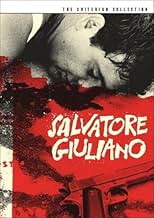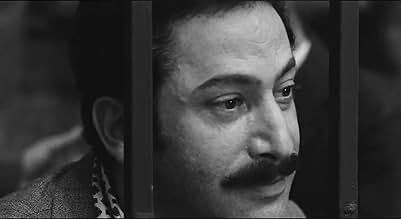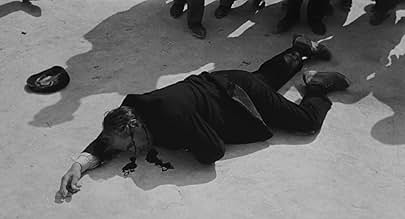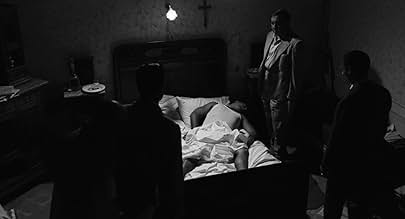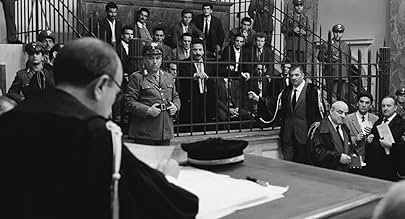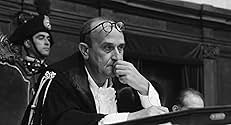IMDb-BEWERTUNG
7,3/10
5212
IHRE BEWERTUNG
Die undurchsichtigen und komplizierten Wendungen zwischen der Staatsgewalt, der Unabhängigkeitspartei und der Mafia im Sizilien der 40er-Jahre gipfelt im Tod von Salvatore Giuliano.Die undurchsichtigen und komplizierten Wendungen zwischen der Staatsgewalt, der Unabhängigkeitspartei und der Mafia im Sizilien der 40er-Jahre gipfelt im Tod von Salvatore Giuliano.Die undurchsichtigen und komplizierten Wendungen zwischen der Staatsgewalt, der Unabhängigkeitspartei und der Mafia im Sizilien der 40er-Jahre gipfelt im Tod von Salvatore Giuliano.
- Auszeichnungen
- 6 Gewinne & 4 Nominierungen insgesamt
Frederico Zardi
- Pisciotta's Defense Counsel
- (Nicht genannt)
Pippo Agusta
- Minor Role
- (Nicht genannt)
Sennuccio Benelli
- Reporter
- (Nicht genannt)
Giuseppe Calandra
- Minor Official
- (Nicht genannt)
Pietro Cammarata
- Salvatore Giuliano
- (Nicht genannt)
Max Cartier
- Francesco
- (Nicht genannt)
Nando Cicero
- Bandit
- (Nicht genannt)
Pietro Franzone
- Seperatist
- (Nicht genannt)
Giovanni Gallina
- Bit Part
- (Nicht genannt)
Vincenzo Norvese
- Bit Part
- (Nicht genannt)
Carmelo Oliviero
- Don Nitto Minasola
- (Nicht genannt)
Renato Pinciroli
- Pinciroli
- (Nicht genannt)
Francesco Rosi
- Narrator
- (Synchronisation)
- (Nicht genannt)
Giuseppe Teti
- Priest of Montelepre
- (Nicht genannt)
Cosimo Torino
- Frank Mannino
- (Nicht genannt)
Empfohlene Bewertungen
Interesting neo-realistic, quasi-documentary film with notable editing. But did the film deserve the Best Director award at Berlin over Bergman's "Through a glass darkly"? The Swedish film was superior. Martin Scorsese likes it because he can identify with the Italian politics and sociology of that time. The Rosi film is good but overrated.
Francesco Rosi's cinema are around political matters, a tough subject too swallow for usual cinephiles, due the hard life which we lives are enough to stand, but some facts needs a better understanding as this picture suggests, how Sicily gets his independence from Italy is plentiful explained here, each facts were expose in this overlong picture, but Francesco wisely put forward a cursed triangle of forces, the mob, the separatists and the dangerous outlaws who help them in hope to get their crime's amnesty, after they got Sicily's autonomy starts another hard issue, the communist, such thing was totally inconceivable to Italian standards at it's time, a mass killing was prompt provides by the rich farmers and also by the mob, the Giuliano the leader almost didn't appears on the movie, his second on command and your fellows conrades in-arms were charged by the massacre, interesting picture over this dry land on Italy's south, the mountainous island Sicily !!!
Resume:
First watch: 2019 / How many: 1 / Source: DVD / Rating: 8
Resume:
First watch: 2019 / How many: 1 / Source: DVD / Rating: 8
Review of Salvatore Giuliano (1962)
Directed by Francesco Rosi, Salvatore Giuliano (1962) is a gripping, politically charged Italian film that blends the genres of crime drama and historical reconstruction. The film portrays the life and death of Salvatore Giuliano, a real-life Sicilian bandit who became a legendary figure in post-war Italy. Giuliano's story is tragic, marked by his transformation from a rebellious hero to a notorious outlaw and his eventual murder under mysterious circumstances.
Rosi's approach to the material is unique. The film doesn't rely on a traditional narrative structure but instead unfolds in a fragmented, almost documentary-like fashion, presenting the story from various perspectives. This method of storytelling creates a sense of disorientation, mirroring the confusion and corruption of the political and social forces at play in post-WWII Sicily. By juxtaposing the personal tragedy of Giuliano with the larger political landscape of Italy, the film reveals the complex intersections between crime, politics, and the Sicilian mafia.
The performances are strong, with a particularly noteworthy portrayal of Giuliano by Marcello Mastroianni, whose quiet intensity brings depth to a character that is both a symbol of resistance and a product of the violent environment in which he lives. Rosi's direction maintains a cold, observational tone, which works well to emphasize the film's themes of disillusionment and betrayal.
Visually, the film is stunning, with cinematography that captures the stark beauty of the Sicilian landscape while also reflecting the harsh realities of life for the people caught in the web of organized crime and political corruption. The stark black-and-white visuals, coupled with the atmospheric score by Francesco De Masi, enhance the film's somber and tense mood.
Salvatore Giuliano is an excellent example of the political cinema that emerged in Italy during the post-neorealist era. It's not just a crime story; it's an exploration of the corruption and disillusionment that permeated Italian society during the 1940s and '50s. While the film might feel slow or fragmented at times, its depth and ambition make it a fascinating and insightful watch for those interested in the intersection of politics, history, and cinema.
Rating: 4/5 - A thought-provoking, well-crafted historical drama that shines a light on the murky intersection of crime and politics in post-war Sicily.
Directed by Francesco Rosi, Salvatore Giuliano (1962) is a gripping, politically charged Italian film that blends the genres of crime drama and historical reconstruction. The film portrays the life and death of Salvatore Giuliano, a real-life Sicilian bandit who became a legendary figure in post-war Italy. Giuliano's story is tragic, marked by his transformation from a rebellious hero to a notorious outlaw and his eventual murder under mysterious circumstances.
Rosi's approach to the material is unique. The film doesn't rely on a traditional narrative structure but instead unfolds in a fragmented, almost documentary-like fashion, presenting the story from various perspectives. This method of storytelling creates a sense of disorientation, mirroring the confusion and corruption of the political and social forces at play in post-WWII Sicily. By juxtaposing the personal tragedy of Giuliano with the larger political landscape of Italy, the film reveals the complex intersections between crime, politics, and the Sicilian mafia.
The performances are strong, with a particularly noteworthy portrayal of Giuliano by Marcello Mastroianni, whose quiet intensity brings depth to a character that is both a symbol of resistance and a product of the violent environment in which he lives. Rosi's direction maintains a cold, observational tone, which works well to emphasize the film's themes of disillusionment and betrayal.
Visually, the film is stunning, with cinematography that captures the stark beauty of the Sicilian landscape while also reflecting the harsh realities of life for the people caught in the web of organized crime and political corruption. The stark black-and-white visuals, coupled with the atmospheric score by Francesco De Masi, enhance the film's somber and tense mood.
Salvatore Giuliano is an excellent example of the political cinema that emerged in Italy during the post-neorealist era. It's not just a crime story; it's an exploration of the corruption and disillusionment that permeated Italian society during the 1940s and '50s. While the film might feel slow or fragmented at times, its depth and ambition make it a fascinating and insightful watch for those interested in the intersection of politics, history, and cinema.
Rating: 4/5 - A thought-provoking, well-crafted historical drama that shines a light on the murky intersection of crime and politics in post-war Sicily.
The first time you experience this film is rather like going to an opera without knowing the plot: there are some grand scenes of murder and passion, some incredible scenery, but it's long and you're in a suspended state of confusion much of the time--and it's a two-hour film, almost a documentary.
The second time you watch this film (and you should!) it can be enjoyed on so many levels, and you begin to appreciate Rosi's genius for mixing various kinds of truth, for exposing the sorts of lies governmental bodies can develop to protect their flanks, for demythologizing the idea of the folk outlaw whose ideals are supposedly those of the people. At heart this is a film about Sicily, about an island's struggle to find it's heart and it's heritage--not easy to watch, but magnificently photographed at every turn.
The second time you watch this film (and you should!) it can be enjoyed on so many levels, and you begin to appreciate Rosi's genius for mixing various kinds of truth, for exposing the sorts of lies governmental bodies can develop to protect their flanks, for demythologizing the idea of the folk outlaw whose ideals are supposedly those of the people. At heart this is a film about Sicily, about an island's struggle to find it's heart and it's heritage--not easy to watch, but magnificently photographed at every turn.
A perfect analysis of the most famous gangster, loved from the poor people, of Sicily. Is very good the acting of Frank Wolff as the cousin of Giuliano, Salvatore Pisciotta. On this Film there is the same history of the gangster of the Film "Il Siciliano" with C. Lambert, but here the film is history, there the film is a bad novel.
Wusstest du schon
- WissenswertesMartin Scorsese credits this film as being one of his many inspirational sources for the look and style of his Taxi Driver (1976).
- PatzerWhen his mother comes to view and identify his corpse, Salvatore's stomach clearly moves as the actor struggles to control his breathing.
- VerbindungenEdited into Il sasso in bocca (1970)
Top-Auswahl
Melde dich zum Bewerten an und greife auf die Watchlist für personalisierte Empfehlungen zu.
- How long is Salvatore Giuliano?Powered by Alexa
Details
- Erscheinungsdatum
- Herkunftsland
- Sprache
- Auch bekannt als
- Salvatore Giuliano
- Drehorte
- 98 Via Serafino Mannone, Castelvetrano, Trapani, Sicily, Italien(Giuliano's body)
- Produktionsfirmen
- Weitere beteiligte Unternehmen bei IMDbPro anzeigen
- Laufzeit2 Stunden 3 Minuten
- Farbe
- Sound-Mix
- Seitenverhältnis
- 1.85 : 1
Zu dieser Seite beitragen
Bearbeitung vorschlagen oder fehlenden Inhalt hinzufügen

Oberste Lücke
By what name was Wer erschoß Salvatore G.? (1962) officially released in Canada in English?
Antwort
